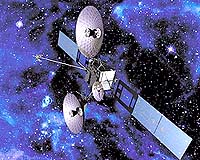 |
Abu Dhabi, UAE (SPX) Oct 20, 2009 Following the successful launch of the UAE's first remote sensing satellite in July, engineers in the Emirates are already designing an advanced version which will provide government agencies with greater help to shape the country's future. The Emirates Institution for Advanced Science and Technology (EIAST), which launched Dubai-Sat 1, said that lessons learnt in its development will ensure that the follow-up project delivers an enhanced quality of data. Information and images gathered from space will be vital to government agencies for infrastructure development, rural and urban development planning, management of natural disasters and provision of accurate maps. EIAST technicians who worked alongside South Korean engineers on Dubai-Sat 1 have taken the lead role in designing Dubai-Sat 2. "The second satellite is currently in the early planning stage, but we already know that there will be improvements in the quality of the data and images it delivers as a result of what our engineers have learned," EIAST project manager Salem Al Marri said. Al Marri confirmed EIAST's full support for the second Global Space Technology Forum, to be held at the Abu Dhabi National Exhibition Centre from 7-9 December, and will use the event as a platform to speak about their exciting launches and key projects. "It's very important to the industry to have an event dedicated to space technology, especially at a time when countries across the region are eager to join the space age in a big way," said Al Marri. "The forum will bring together the industry's key players and other world-leading space agencies and programmes, to share ideas, knowledge and progress. Next generation space research and commercial space applications present huge opportunities for everyone involved in this area," he added. The Global Space Technology Forum was launched last November by Streamline Marketing Group. This year, senior directors from NASA and GEOS will be addressing the event, highlighting the strong support the event has gained from the international space community. After Dubai-Sat 1's launch from the Baikonur complex in Kazakstan, the former centre for the Soviet space programme, EIAST engineers will need three to six months to fine tune its systems before data gathered from space can be made available for use. The Dubai-Sat projects are among more than 20 emerging national space projects in the Middle East and Africa participating in the Global Space Technology Forum in 2009, a region rapidly evolving as one of the key growth markets for the global space industry. LSE Space Middle East, a UAE-based joint venture between LSE Space Engineering and Operations AG (Germany) and Lootah Technical Centre (Dubai, UAE) has also announced their support of the event as a silver sponsor. Frank Niehaus, CEO, LSE Space Middle East said: "The Global Space Technology Forum is the first dedicated forum for space technologies in the Middle East. We attended last year's event and have increased our involvement in 2009, as part of our commitment to the UAE and the local companies dealing with space activities." Niehaus, whose company specialises in Satellite Operations and Engineering, Ground Station Operations and Architecture, and Ground System Engineering said the UAE can benefit greatly from space technologies and applications. "This region needs more access to space to accommodate the increasing demand of the local population for modern communication means and Earth Observation Systems. Space technology is a light house technology for every country, as it helps to develop leading edge technologies and advanced engineering know-how." The emerging regional space industry will be a highlight of the December forum, which will draw senior representatives from space agencies and national space programmes, government officials and policy makers, as well as entrepreneurs, investors, engineers, scientists, and airline and aerospace senior management. Share This Article With Planet Earth
Related Links LSE Space Middle East Global Space Technology Forum Space Technology News - Applications and Research
 NASA Retires Pioneering Tracking And Data Relay Satellite
NASA Retires Pioneering Tracking And Data Relay SatelliteGreenbelt MD (SPX) Oct 19, 2009 After a rocky start and then a stellar 26-year performance, NASA's Tracking and Data Relay Satellite - 1 (TDRS-1) is scheduled for decommissioning on October 28. Communications equipment that links TDRS-1 to the ground has failed and without this capability it can no longer relay science data and spacecraft telemetry to ground stations located at the White Sands Complex in Las Cruces ... read more |
|
| The content herein, unless otherwise known to be public domain, are Copyright 1995-2009 - SpaceDaily. AFP and UPI Wire Stories are copyright Agence France-Presse and United Press International. ESA Portal Reports are copyright European Space Agency. All NASA sourced material is public domain. Additional copyrights may apply in whole or part to other bona fide parties. Advertising does not imply endorsement,agreement or approval of any opinions, statements or information provided by SpaceDaily on any Web page published or hosted by SpaceDaily. Privacy Statement |